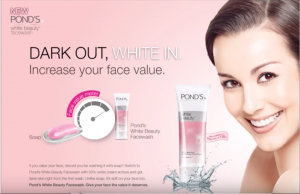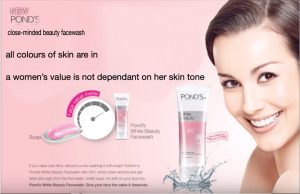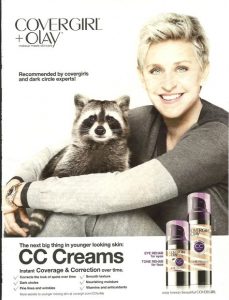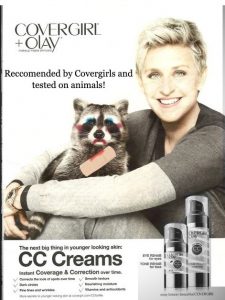Original Ad

The advert which will be used for the purpose of my culture jam is a Ponds advert from 2012 which promotes a “white beauty facewash”, intended to lighten the skin of those who choose to use it. The ad literally says that dark skin is out, while white skin is what people should aim to have in order to “increase [their] face value”. Issues regarding skin whitening products are highly prevalent in today’s society, especially in Asia which is where this advert was originally posted. The intended consumers for this product are most likely women, as shown by the stereotypically feminine colors used in the ad, being primarily pink and white, with a ‘fair’ appearing woman shown to draw attention viewers. One of the ideas posed in the advert in particular of lighter skin increasing one’s face value can also be considered both disrespectful and misogynistic to women as a whole, as it implies that the value of a woman in society is directly linked to her appearance and her skin color rather than aspects of personality and other non-physical attributes which are less superficial. Furthermore, the idea ingrained in many nations that women should be fair is in itself an issue that relates to intersectional feminism. This is because it targets the insecurities of women of color specifically, pushing ideas that women of color have less ‘face value’ unless they follow the Eurocentric beauty standards which can often be pushed in the western world. I plan to use my culture jam in order to challenge the two main ideas portrayed in the ad- the ideas that a women’s value is dependent on her physical attributes as well as the idea in general that women should feel the need to lighten their skin in order to be beautiful.
Jammed Ad

The jammed version of the ad replaces the words “white beauty facewash” instead with “close-minded beauty facewash” and states that “all colors of skin are in” and “a women’s value is not dependant on her skin tone”. These alterations intend to reveal the true close-minded ideas portrayed in the original ad, which aims to make women feel like they are not beautiful if they are darker-skinned since “dark is out” and the use of “white beauty” again pushes the idea that one must be white in order to be considered beautiful. Also, the idea that “a woman’s value is not dependent on her skin tone” is meant to directly challenge the statement in the original ad which stated being fair increases one’s “face value”. Alterations reveal that the ad originally tried to push whitening products by making women feel like having whiter skin will increase their value, and thus challenges this idea by raising the idea that skin tone does not actually define the worth and value of a person in society. Ideally, those who view the jammed ad are inspired to consider Eurocentric beauty standards and the ways in which they are pushed onto darker-skinned people in today’s society. Considering the idea that “white beauty” transforms into “close-minded beauty” suggests that considering only those who have light skin of value is a matter of close-mindedness rather than a preference which should be considered acceptable in modern society as the advert originally implies. Also, it forces viewers to question what attributes make them consider a woman to be of “value”. By displaying the idea that skin-tone being a measure of one’s value is unacceptable and unusual, viewers are forced to reconsider their prior ideologies- and the jammed ad implies a woman’s value is placed on who she is rather than what she looks like.
Works Cited:
Harper, Hollie. “Pond’s White Beauty Facewash.” Medium, 24 May 2018, medium.com/hollie-harper/the-white-lady-con-job-1be057c699b5.

